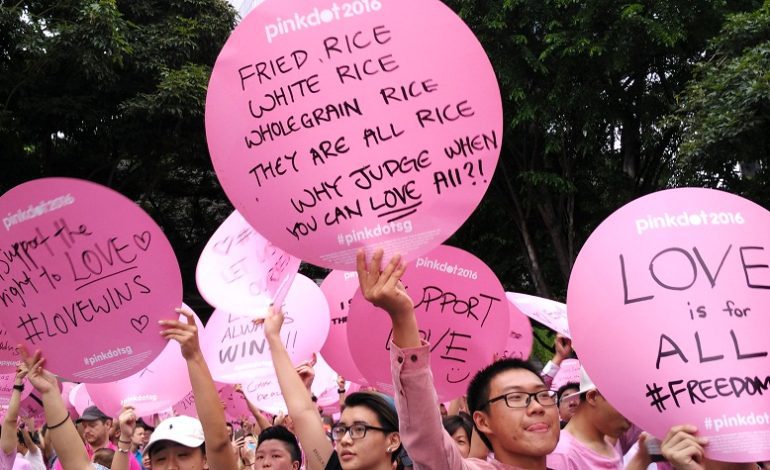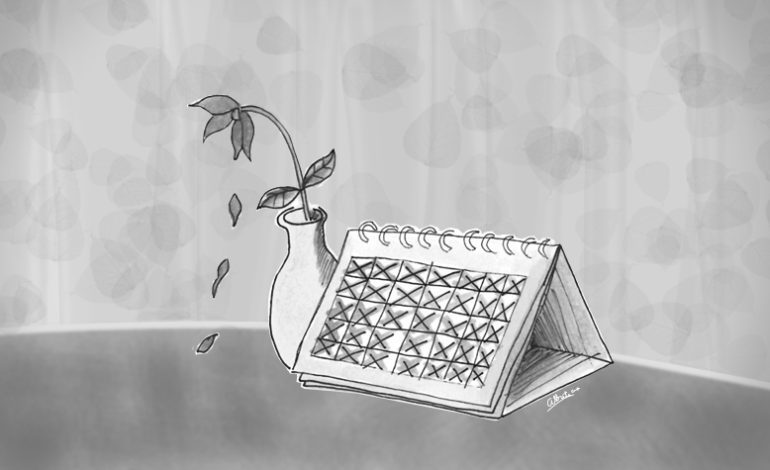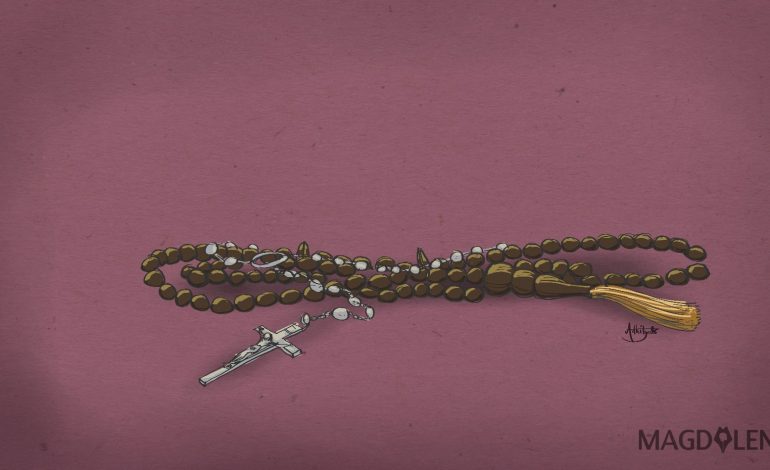Celebrating Freedom to Love at Pink Dot SG

Pink, every shade of pink. Supporters of Pink Dot SG literally transformed the ordinary park to a fascinating, lively, pinkish arena. People from various backgrounds, ethnicity, age, men, and women, all immersed in harmony on June 4, 2016.
It was the eighth annual Pink Dot SG held at Hong Lim Park, the only venue in Singapore where public protests are allowed. People wrote messages of love onto placards and raised them at the same time to send a united message of support to foster a society that embraces diversity. Singaporean citizens and permanent residents were not the only ones who came to celebrate “freedom to love” – the event was attended by people from all over the world, who joined the four-hour long celebration.
Pink Dot 2016 adopted the theme “everyday heroes”: the fact that anyone can be a hero to people around them through acts of love and understanding, whether big or small. Three mini-documentaries were screened as campaign videos, telling powerful stories from the real lives of everyday heroes who made an impact on the lives of their friends, family members, and members of the Lesbian, Gay, Bisexual and Transgender (LGBT) community.
They were led by Pink Dot 2016 Ambassadors, television host and writer Anita Kapoor; comedian, singer and actress Liu Ling Ling; and rapper, music producer and filmmaker ShiGGa Shay. Each ambassador played a powerful role in reaching out to their respective spheres of influence to underline the importance of supporting Pink Dot and the LGBT community.
For the organizers, it is critical that LGBT people are able to live their lives without fear of discrimination at home and in their workplace.
“In Singapore, where we have laws and policies that discriminate against us and censorship laws that perpetuate negative stereotypes of the LGBT community and seek to erase any neutral or positive portrayal of the community, we are often told that the country is conservative and not ready. But we believe that Singapore is not as conservative as it is made out to be,” Pink Dot Spokesperson, Paerin Choa (40), said on Friday.
In 2009 Pink Dot was started to create a platform for the more open minded and liberal Singaporeans to come together to support their friends and families who are LGBT. The Pink Dot movement strives to create awareness and promote understanding to foster a kinder and more inclusive Singapore, where everyone, including LGBT people can call home.
But, change always provokes confrontations and resistance. This time in the form of public call to wear white to promote “traditional” family values, led by Christian pastor Lawrence Kong.
“Our detractors, though very loud and vocal, are but a very small segment of people. The Singapore we know is generally tolerant and non-confrontational. We may face resistance, but the increasing support and encouragement that the LGBT community receivess throughout these eight years makes the fight and challenges all worthwhile,” he said.
As Singapore is a multi-racial, multi-cultural and multi-religious country with secularism at its core, Paerin and the community believe that Singaporeans are generally accepting of diversity, and they hope to show that families and societies are best built upon love and understanding rather than on exclusion.
Simple dreams, harsh reality
The reality is far from ideal of course. Bjorn Yeo (36) who works as graphic designer and entrepreneur has a simple dream: that he and his boyfriend of 11 years can live together.
“We are still living with our parents, as we cannot afford private apartments and are not eligible for subsidized public housing, which is only offered to married couples. I wish for the day when I am treated equally alongside my fellow Singaporean,” he said.
Growing up gay is tough in Singapore. Laweyer Deryne Sim, 30, said since his years growing up, there had never been positive portrayal of gay characters in mainstream media.
“All you hear are the words of your parents, teachers and pastors telling you that being gay is unnatural, a grievous sin, that you will not lead a happy life and that you are going to hell if you don’t change your sexual orientation,” Deryne said.
Only after she graduated and started working did she get to know some older, gay couples. They were flourishing in their careers and their families welcomed and acknowledged their partners. Deryne also noticed that none of them were depressed or worried that they were doomed to hell.
“It was only then that I saw that it was possible to be happy and gay. With others to show the way, I found the courage to come out. First, among my friends, then at work, and, finally, at home,” Deryne said.
But she also realizes that not everyone has the luxury of coming out. For a teenager in a Singapore school, coming out to a counselor or teacher would probably mean having to go for conversion therapy. Worse, it may mean getting kicked out of home, if the counselor or teacher tells the student’s parents.
At work, coming out could mean being refused a job, denied a promotion or even getting fired. Deryne hopes that in the future Singapore media will portray a more balanced view of LGBT people, and that conservative Singaporeans will put aside their prejudices and have genuine conversations with LGBT people.
Being gay is strictly prohibited by Singapore’s law. Section 377A of Singapore’s Penal Code stated: “Any male person who, in public or private, commits, or abets the commission of, or procures or attempts to procure the commission by any male person of, any act of gross indecency with another male person, shall be punished with imprisonment for a term which may extend to 2 years.”
Paerin says there are also censorship laws that erase any positive or neutral portrayal of LGBT individuals. He also explains that there are very limited social, mental health and healthcare services to meet the LGBT community’s needs. There is a lack of support for LGBT students in schools, and virtually no employment protections for LGBT individuals in the workplace.
Yet he remains optimistic because of the apparent shifting social attitude on LGBT.
“Although the relevant ministries have not taken any meaningful steps in improving the situation for the LGBT community, we are heartened that we have seen a significant increase in acceptance of the LGBT community in Singapore,” he said.
For instance, the attendance of Pink Dot has increased more than tenfold in seven years. From 2,500 participants when it started in 2009, it had grown substantially to attract 28,000 supporters in 2015.
He also observes that more LGBT individuals have stopped living in fear and are coming out; that the conversations and debates surrounding LGBT issues have matured; and that more multi-national companies in Singapore are creating a more inclusive and safer work environment for their LGBT employees.
Paerin thinks policies and laws are not keeping up with the pace the society is evolving. He expressed hopes that the government would take more tangible and meaningful steps to create a fair and safe place for its LGBT citizens.
“We urge them to do the right thing, instead of the convenient thing. My simple hope is that there no longer be a need for Pink Dot in the future, when there is truly no longer any social or legal discrimination against LGBT people in Singapore,” he said.
Indonesians’ Solidarity
Jonta Saragih, an activist from the development organization HIVOS Indonesia, was attending the event for the first time and felt hopeful that he would one day see a similar event in Indonesia. Jonta recalled being bullied often in school by his friends and teachers because he was gay. He said his family considered him ill and in needs of medication to make him straight.
“Now most of them already accept me, even though they still hope I can be cured,” he said.
Attending the event with him was his friend Amik Purnima, a straight and hijab-wearing Indonesian who openly supports LGBT.
Impressed by the event, she said: “Everyone is in pink, and there seemed to be no gap between women, men, adults, and children. I feel like I’m surrounded by lots of love!” she said.
Dede Oetomo, founder of one of the oldest LGBT organizations in Indonesia, Gaya Nusantara, also hopes there will be Pink Dot SUB to be held in Indonesia. Both Indonesia and Singapore don’t have laws that guarantee there are no discrimination based on sexual orientation and gender identity, Dede said. Homosexual acts are not criminalized in Indonesia, except in local bylaws in Aceh and South Sumatera and some cities. On the other hand, in Singapore, homosexual act is criminalized, although the government has promised not to prosecute people who conduct homosexual activities.
“In Singapore, LGBT movement is legally not allowed exist. In Indonesia, it is able to exist even though it is officially registered under social movements. The events like Q! Fim Festival, although interrupted by religious extremists, are still allowed in Indonesia. In Singapore, such events are not allowed,” Dede said.
“My prediction, if Pink Dot SUB will be held next year, it will be prepared in the manner of guerrilla warfare, because in Indonesia there is no space like Hong Lim Park, where the government guarantees freedom of expression,” he added.
A storyteller at heart, Yohannie Linggasari started writing while in elementary school, when she and her friend made series of lame short stories and rented it to their friends. Feel free to say hello to her via email at [email protected].
*Photos by Yohannie Linggasari & Pink Dot






















